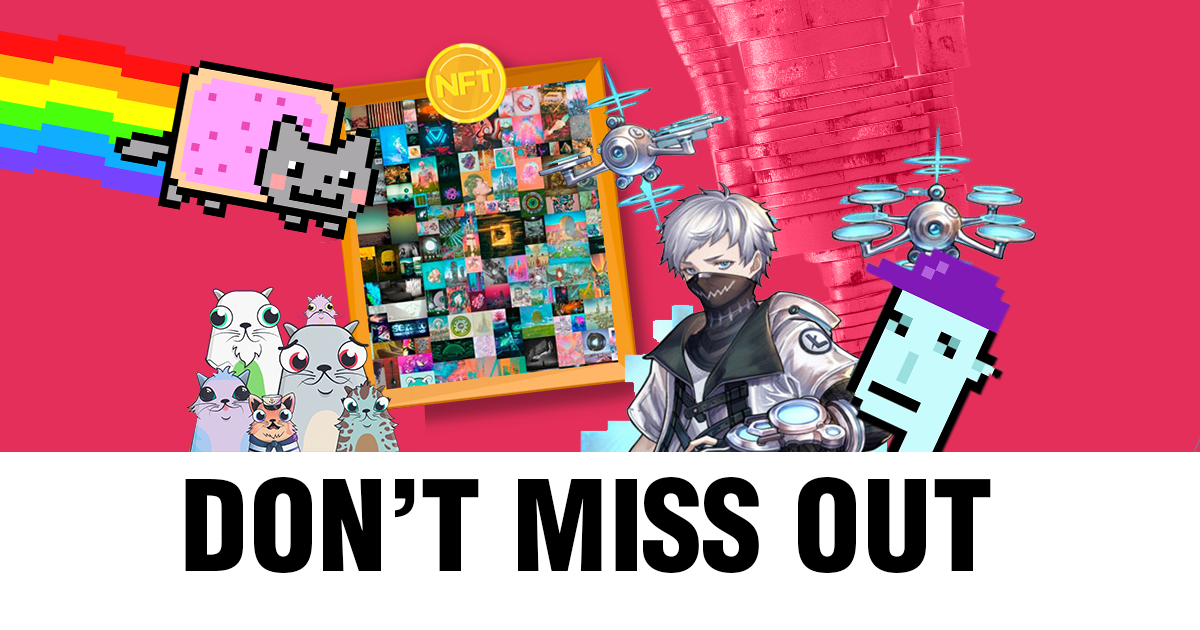Introduction to NFTs
Market Meditations | April 14, 2021

What Are NFTs and What is Their Appeal?
If you already have an understanding of what NFTs are and their appeal, feel free to skip this section. If not, let’s spend a minute talking about it.
NFT = Non Fungible Token.
The only difficult part of this is the concept of something being ‘Fungible’ and thereby what it means to be ‘Non-Fungible’.
A dollar bill is fungible. The $10 bill in our wallet holds the exact same value as the $10 in your wallet. We could exchange them with each other and it would make no difference. They are interchangeable.
For something to be non-fungible, it cannot be interchangeable. Consider the laptop I am currently writing this on and the laptop you are currently reading this on. We could exchange laptops but they are not interchangeable. I would have your laptop with all your files, documents and preferences and you would have mine. They are unique assets.
The difference seems simple, arbitrary even. So, what’s the appeal of NFTs?
1️⃣Ownership.
NFTs can be used to prove ownership or provenance of an asset. Where provenance is the ability to track previous ownership and authenticate it. If you follow the token on the blockchain, you can see there is only one owner of the NFT. Not only do we see the appeal of ownership on the internet but indeed in socioeconomic systems. For instance, in capitalism compared to communism; whereby capitalism allows for property ownership and communism does not.
2️⃣Scarcity.
The next attractive factor is scarcity. There can only be one owner at any given time. From a philosophical viewpoint, we’ve introduced a new concept to the internet. Before NFTs existed, any good on the internet could be cut and pasted. The web was essentially limitless. However, NFTs have introduced scarcity into the internet; we have introduced scarcity into a previously unlimited world.
3️⃣Passion.
Last appeal factor is passion. As we are about to see, there are different types of NFTs and oftentimes the reason for purchase or collection is a bond, attachment or passion for the asset in question. Be it a game asset or art.
Now we have a better understanding of what NFTs are and what their appeal is, we can consider direct exposure to different types of NFTs.
Direct Exposure to Different Types of NFTs
Direct exposure to NFTs means buying NFTs that you personally find interesting or unique.
For direct exposure to NFTs, Ethereum provides a range of NFT marketplaces like OpenSea and Rarible. This means you’ll want to have a browser wallet like MetaMask so you can directly interact with NFT marketplace’s smart contracts. Marketplaces like the ones we have mentioned allow purchases and sales in many tokens but ETH is typically the main currency of choice.
You don’t need to be extremely wealthy to purchase NFTs. The headlines are full of extremely expensive sales but you can very easily find cool projects within your budget. A useful NFT marketplace data website is NonFungible, which allows you to analyse prices and recent market activity.
Once your crypto money, budget and wallet are ready you can start to purchase NFTs. But what are the different options and what should you be looking out for?
NFTs are a very diverse and changing ecosystem but as @AndrewSteinwold explained to us in a recent podcast, there are 5 main categories and value drivers we can consider to assist in our purchases. We will now summarise Andrew’s overview but for more detail be sure to check out the podcast or his website sfermion.
1️⃣Collectibles
Description: A collectible is any object regarded as being of value or interest to a collector. These are digitally native assets with little to no utility such as NBA Top Shot or Crypto Kitties.
Value Driver: The value driver is the narrative around the asset. Such as a compelling story. For instance, Cryptopunks (considered the first NFTs on Ethereum) were made in the process of 3 years by two geniuses in Brooklyn (who were not especially wealthy). They gave out 10,000 cryptopunks for free and kept 1,000 for themselves. There is a creative narrative around aliens and zombies and the cheapest cryptopunk is now around $48,000.
2️⃣Game Assets
Description: In contrast with collectibles that have little to no utility, these are assets with high levels of utility within their universe. Game assets facilitate the playing of video games and the ability to earn money through it. Later in this newsletter, we’ll discuss a new, exciting and powerful game asset: Chainbinders.
Value Driver: All about the utility. Consider a sword in World of Warcraft with 10 attack damage or another powerful statistic.
3️⃣Virtual Land
Description: These are user owned social e-commerce gaming and creative platforms all rolled into one. Unlike traditional social platforms, they provide the opportunity for skin in the game. You can gain potential upside by buying a piece of land. If the overall platform does well, the value of land increases. Through this model, social platforms go from value extractive to value additive.
Value Driver: Similar to physical land, value drivers are location, content and parameters. Location: some locations are more valuable than others (such as Illinois compared to Manhattan). Content: whether it is a skyscraper compared to a single family home. Parameters: the zoning laws, height, width and length you are allowed to build in this piece of land.
4️⃣Crypto Art
Description: Perhaps the most accessible and well known version of NFTs. This is art that is tokenized and put on a blockchain. SuperRare and NiftyGateway are particularly popular for crypto art.
Value Driver: Similar to traditional art, the main value driver is the artist’s reputation. Banksy crypto art has sold for millions due to his associated brand and reputation.
5️⃣Other
Description: Categories that are small today but may end up being extremely large such as domain names, property titles and insurance.
Value Driver: Value drivers are variable because the category is variable.
Once again, be sure to check out our podcast with Andrew for more on his categories.
Risks of Direct Exposure
Now that you are aware of the means to directly purchase NFTs, some possible avenues and value drivers, we should also familiarize ourselves with some of the risks. There are no free lunches.
Most NFTs are illiquid assets (we say most because as we will discover shortly, Chainbinders has found a creative solution to this). The value is subjective and it is not guaranteed that you will make back the ETH you spend. The NFT space is still in a very early stage and there is no guarantee you’ll be able to sell to a next buyer, let alone at a higher price.
The NFT Market is also overheated right now (assets are over-inflated) and is showing some signs of cooling down. When it does cool down, you should be happy that you own these things. NFTs are not pure financial assets.
A way to mitigate this risk is to make your direct NFT purchases with the viewpoint of holding for a very long time. If this still doesn’t appeal to you and you would rather reap the financial rewards than invest long term in a collectible, let’s consider methods for indirect exposure.
Methods for Indirect Exposure
1️⃣Fractionalisation
As we have seen, direct exposure requires careful selection with an understanding of value drivers and a long term horizon. For those purely seeking exposure to high performing NFTs, fractionalisation may prove an attractive option. Note this is still a very early industry.
NFT fractions, also known as shards, are created by issuing an ERC-20 token that represents the underlying asset. ERC-20 tokens allow for the creation of what are essentially derivatives of the underlying asset.
The two most well-known NFT fractionalization services are NIFTEX and NFTX. These also represent the two main categories. NIFTEX is a service for investing in NFT fractions while NFTX is an NFT index fund.
Shardmarketcap.io is a good place to view different bundles or fractionalised NFTs. For instance, The MetaONEz is a bundled basket of virtual land and The Nifty ONEz is a bundled basket of high value art from different artists.
2️⃣Ethereum
Previously in a Youtube video, we mentioned that the majority of NFTs are exchanged via Ethereum. If you are getting exposure to the underlying platforms then you are getting exposure to the entire market. So, another option is to purchase Ethereum.

